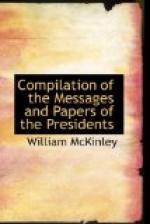The merit system is simply one method of securing honest and efficient administration of the Government; and in the long run the sole justification of any type of government lies in its proving itself both honest and efficient.
The consular service is now organized under the provisions of a law passed in 1856, which is entirely inadequate to existing conditions. The interest shown by so many commercial bodies throughout the country in the reorganization of the service is heartily commended to your attention. Several bills providing for a new consular service have in recent years been submitted to the Congress. They are based upon the just principle that appointments to the service should be made only after a practical test of the applicant’s fitness, that promotions should be governed by trustworthiness, adaptability, and zeal in the performance of duty, and that the tenure of office should be unaffected by partisan considerations.
The guardianship and fostering of our rapidly expanding foreign commerce, the protection of American citizens resorting to foreign countries in lawful pursuit of their affairs, and the maintenance of the dignity of the nation abroad, combine to make it essential that our consuls should be men of character, knowledge and enterprise. It is true that the service is now, in the main, efficient, but a standard of excellence cannot be permanently maintained until the principles set forth in the bills heretofore submitted to the Congress on this subject are enacted into law.
In my judgment the time has arrived when we should definitely make up our minds to recognize the Indian as an individual and not as a member of a tribe. The General Allotment Act is a mighty pulverizing engine to break up the tribal mass. It acts directly upon the family and the individual. Under its provisions some sixty thousand Indians have already become citizens of the United States. We should now break up the tribal funds, doing for them what allotment does for the tribal lands; that is, they should be divided into individual holdings. There will be a transition period during which the funds will in many cases have to be held in trust. This is the case also with the lands. A stop should be put upon the indiscriminate permission to Indians to lease their allotments. The effort should be steadily to make the Indian work like any other man on his own ground. The marriage laws of the Indians should be made the same as those of the whites.
In the schools the education should be elementary and largely industrial. The need of higher education among the Indians is very, very limited. On the reservations care should be taken to try to suit the teaching to the needs of the particular Indian. There is no use in attempting to induce agriculture in a country suited only for cattle raising, where the Indian should be made a stock grower. The ration system, which is merely the corral and the reservation system, is highly detrimental to the Indians.




